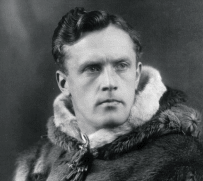Helge Ingstad
| Helge Ingstad | |
|---|---|

Ingstad in his trapper days in the late 1920s (photo taken 1932 from his book about Canada The Land of Feast and Famine, 1933).
|
|
| 2nd Governor of Svalbard Acting |
|
|
In office 28 July 1933 – 1 September 1935 |
|
| Monarch | Olav V |
| Prime Minister |
Johan Ludwig Mowinckel Johan Nygaardsvold |
| Preceded by | Johannes Gerckens Bassøe |
| Succeeded by | Wolmar Tycho Marlow |
| 1st Governor of Erik the Red's Land | |
|
In office 1932–1933 |
|
| Monarch | Olav V |
| Prime Minister |
Peder Kolstad Jens Hundseid Johan Ludwig Mowinckel |
| Preceded by | Position established |
| Succeeded by | Position abolished |
| Personal details | |
| Born |
30 December 1899 Meråker |
| Died |
29 March 2001 (aged 101) Diakonhjemmet Hospital, Oslo |
| Spouse(s) | Anne Stine Ingstad |
| Children | Benedicte Ingstad |
| Alma mater | University of Oslo Faculty of Law |
Helge Marcus Ingstad (30 December 1899 – 29 March 2001) was a Norwegian explorer. After mapping some Norse settlements, Ingstad and his wife Anne Stine, an archaeologist, in 1960 found remnants of a Viking settlement in L'Anse aux Meadows in the Province of Newfoundland in Canada. With that they were the first to prove conclusively that the Greenlandic Norsemen had found a way across the Atlantic Ocean to North America, roughly 500 years before Christopher Columbus and John Cabot. He also thought that the mysterious disappearance of the Greenland Viking settlement in the 14/15th century could be explained by their emigration to North America.
Helge Ingstad was the son of Olav Ingstad (1867–1958) and Olga Marie Qvam (1869–1946) in Meråker, Nord-Trøndelag. His father was municipal engineer in Tromsø and held the title of factory supervisor. He was the grandson of lawyer professor, Marcus Pløen Ingstad. Helge and his family moved to Bergen in 1915 where he attended the Bergen Katedralskole (1911-1918), and after graduating cand. jur. in 1922 he took up a practice of lawyer in Levanger.
Helge Ingstad was originally a lawyer by profession, but, ever an outdoorsman, he sold his successful law practice in Levanger and went to Canada's Northwest Territories as a trapper in 1926. For the next three years, the Norwegian travelled with the local Indian tribe known as the Caribou Eaters. After returning to Norway, he wrote the bestselling Pelsjegerliv ("Trapper Life") about his time in Canada, published in English as The Land of Feast and Famine (Knopf, 1933).
...
Wikipedia
